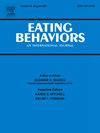Ethnic identity, body appreciation, and intuitive eating in a national sample of U.S. adults
IF 2.4
3区 医学
Q2 PSYCHIATRY
引用次数: 0
Abstract
Current research on eating behaviors and body image has shifted from an emphasis on disordered eating and body dissatisfaction to a broader approach that incorporates adaptive eating and positive body image. This study explored the direct relationships among body appreciation, intuitive eating, and ethnic identity in a representative sample of U.S. participants, while also examining whether ethnic identity moderated the link between body appreciation and intuitive eating. A total of 1018 U.S. adults were recruited through Qualtrics to complete an online survey. Zero-order Pearson correlations were used to analyze the direct relationships among the variables, and multiple regression was conducted to investigate the potential moderating role of ethnic identity. The findings revealed that higher levels of body appreciation were associated with greater intuitive eating, aligning with previous research and confirming this relationship within a representative U.S. sample. Furthermore, individuals with a stronger ethnic identity tended to have a slightly more positive body image and engage in intuitive eating. However, ethnic identity did not moderate the relationship between body appreciation and intuitive eating. These results highlight the importance of promoting body appreciation as a means to foster healthier eating behaviors across diverse groups. Future studies with larger and more diverse samples are needed to further examine how ethnic identity relates to body image and eating behaviors across different racial and ethnic groups. Despite its limitations, this research underscores the potential benefits of body appreciation in improving individuals' relationships with food, regardless of their background.
美国成年人的民族认同、身体欣赏和直觉性饮食
目前关于饮食行为和身体形象的研究已经从强调饮食失调和身体不满转向了一个更广泛的方法,包括适应性饮食和积极的身体形象。本研究在美国参与者的代表性样本中探讨了身体欣赏、直觉饮食和种族认同之间的直接关系,同时也研究了种族认同是否调节了身体欣赏和直觉饮食之间的联系。Qualtrics总共招募了1018名美国成年人来完成一项在线调查。采用零阶Pearson相关分析各变量之间的直接关系,并采用多元回归分析民族认同的调节作用。研究结果显示,对身体的欣赏程度越高,饮食的直觉性越强,这与之前的研究一致,并在一个有代表性的美国样本中证实了这一关系。此外,具有较强种族认同的个体往往具有更积极的身体形象,并从事直觉饮食。然而,种族认同并没有调节身体欣赏与直觉饮食之间的关系。这些结果强调了在不同群体中促进身体欣赏作为培养更健康饮食行为的一种手段的重要性。未来的研究需要更大、更多样化的样本,以进一步研究种族认同与不同种族和民族群体的身体形象和饮食行为之间的关系。尽管有其局限性,但这项研究强调了身体欣赏在改善个人与食物关系方面的潜在好处,而不管他们的背景如何。
本文章由计算机程序翻译,如有差异,请以英文原文为准。
求助全文
约1分钟内获得全文
求助全文
来源期刊

Eating behaviors
Multiple-
CiteScore
4.20
自引率
3.60%
发文量
65
审稿时长
60 days
期刊介绍:
Eating Behaviors is an international peer-reviewed scientific journal publishing human research on the etiology, prevention, and treatment of obesity, binge eating, and eating disorders in adults and children. Studies related to the promotion of healthy eating patterns to treat or prevent medical conditions (e.g., hypertension, diabetes mellitus, cancer) are also acceptable. Two types of manuscripts are encouraged: (1) Descriptive studies establishing functional relationships between eating behaviors and social, cognitive, environmental, attitudinal, emotional or biochemical factors; (2) Clinical outcome research evaluating the efficacy of prevention or treatment protocols.
 求助内容:
求助内容: 应助结果提醒方式:
应助结果提醒方式:


